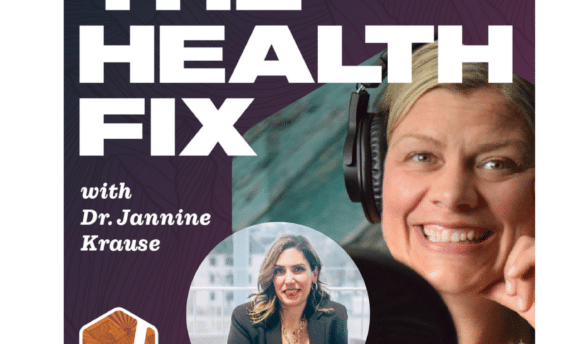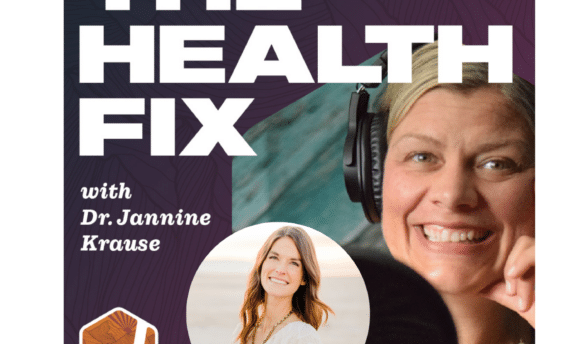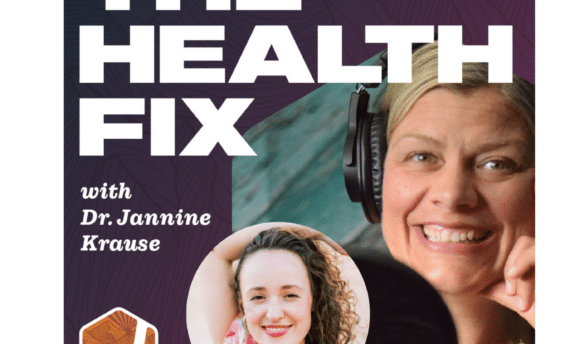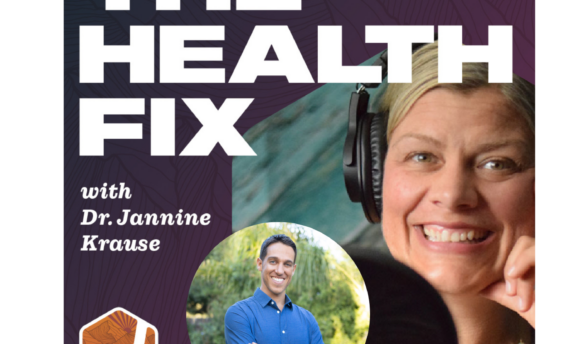Your ancestors were tribal, thus a drive to fit in is primally woven into your DNA. But what happens when you want to relate to someone but it’s not working out as planned? Trying to relate to those in your family and social circles can often provoke a cortisol spike. Relating drama can be the source of a lot of elevated cortisol and stress situations. As a cultural anthropologist Dr. Jonathan Marion has studied the art of relating in various cultures and is bringing his expertise to this episode of The Health Fix, which is the second podcast of a two part interview series. Not only is Dr. Jonathan Marion a cultural anthropologist, he’s also an author, speaker and somatic. In this episode we’ll be talking about the art of relating to others and how to view rejection in a different light.
Dr. Krause’s Protocols
Instructions Included
Traveling soon? Looking to detox or reset your gut? Try one of Dr. Krause’s Fullscript plans.
What You’ll Learn In This Episode:
- Why relationships are actually a practice in relating
- Interpreting rejection as not being a fit vs something about you as a person
- How relating is based on meeting each other’s needs
- Signs your attachment style is preventing you from creating a stable and fulfilling connection

Resources From The Show:
Our Partners
Podcast Transcript
3:41 – The process of relating
17:59 – Becoming aware of any attachment behaviors you may have
21:28 – Attaching our self worth to certain situations
23:!2 – Avoidance pattern
31:54 – Where to find Dr Marion online
Hey, Health Fix junkies. It’s Theresa Lear-Levine from Becoming More Me, the podcast for busy-minded
entrepreneurs that want to be more and do less. Blessed to have appeared on not just one,
but three episodes of the health fix. So I encourage you to check out episode 445, 411,
and 322 of the health fix podcast where I talk about breaking up with your old self,
sabotage, fears, and thriving through life’s changes.
Mm, perimenopause, using EFT tapping and hypnotherapy.
You’re listening to the Health Fix podcast.
Here’s your amazing host, Dr. Jannine Krause.
Hey, health junkies.
This episode of The Health Fix Podcast is the second podcast of a two-part interview
series with cultural and anthropologist, author, speaker, and health coach, Jonathan
Marion.
If that name sounds familiar, that’s because he was on the podcast episode 456, where we
talked about being present in your life.
In this episode, we’ll be talking about the art of relating to others and navigating rejection.
Stress and the impact of cortisol on your health are crucial to evaluate.
And today, we’re going to explore how relating to others ties into optimizing your health.
Let’s introduce you or reintroduce you to Jonathan Marion.
JONATHAN: I think so, and I know,
I remember the relationship I was in
where I first sort of really got a handle on this.
And it was a very different relationship
because it wasn’t one thing,
because it wasn’t, you know, it’s a relationship
and therefore it needs to look like X
because that’s what I think relationships should look like.
was, wait a minute, there were some parts of this that are really different than I expected
or thought they would be. And some of how these things work, you know, maybe better or
worse, but those are just, you know, how I feel about them. But they’re not inherently
good, bad, right or wrong. If it’s what’s in the service of this person. And if I’m
prioritizing the person and not the relationship, now we can get somewhere because it’s not,
this is how things should be, it’s, wait a minute, how is this affecting them?
How is this landing with them?
How do I feel about this?
And none of it is external to the people involved.
of it is about in the service of the relationship as if that is something other than a dynamic
exchange between us.
JANNINE: I’m like, my mind’s going about relating.
I’m like stuck on that because it’s like, it’s so much about relating to others.
And I think for me, you know, and I’ll bring in my personal story a little bit here so
the folks maybe get a little bit of a sense.
I mean, I since day one, I’ve always wanted to connect with people.
And, and when I don’t, I feel like I did something wrong, right?
I’m not relating.
Now I’m going, okay, I’m not relating.
Why am I not relating comes the next question in my head?
And, and what is it?
How can I step back and go?
What did I not relate to in that person or what did I not relate to in my own
self in that particular conversation?
So how do you, how do you coach through folks through the process of relating?
How do you do that?
And that’s a big whole can of worms here.
JONATHAN: Yeah.
So I think the first and most important point is to recognize that it’s not a one
direction exchange relating.
It’s two directions at least, right?
Um, and so all we can do is.
Try and build the bridge or lean in.
The minute we’re trying to pull someone over, now we’re into that anxious attachment, right?
It’s I want you to be relating with me and I’m going to try and pull you into that.
That’s ultimately not going to work.
If it’s I’m afraid you won’t relate to me and so I’m not even going to try and
relate to you now we’re in avoidance.
If we sometimes do part of one and sometimes part of the other,
other now we’re in that anxious, avoidant or disorganized.
When we’re in secure attachment, it’s, I would like to invite a relation with you and I’m going to
build my part of the bridge and the foundation. And then I’m going to see, are you going to meet me
there? And if so, what’s the exchange? And so I think we need to start there because you can’t
make people relate to you. And we talked about it last time. Again, one of the things I spend a
lot of time doing is Brazilian Zouk dancing. It’s a type of partner dance form. But I have
some experience with salsa and ballroom and bachat and all of those things. But in social dancing,
I want to dance with the people who want to dance with me. And it’s the same thing in life.
You, I want to relate to the people who want to relate with me. And so I may put invitations
out, but I’m not going to try and get people to relate to me. I’m not going to try and get
get people to dance with me who don’t want to. But I’m also going to be careful to not avoid
the invitations because I’m afraid someone’s going to say no. And so how do I coach people
through this? I really use the same general framework that I introduced last time with sort
of strategic life goals. But again, I use the being framework because we’re human beings, not human
doing is not human accomplishing or anything like that.
And so it’s begin where you are.
So what’s going on for me?
I need to understand what is it that I’m actually–
how am I showing up in this moment?
If I’m feeling insecure, OK, what’s that about?
And if I can’t even acknowledge that,
I’m not going to be able to build an authentic relationship
because I’m trying to fill an internal need with an insecurity
with someone else’s approval or praise.
And there’s nothing wrong with getting acknowledgement
with being witnessed by another person.
I think that’s what is the most powerful part
of relating to someone else,
is having someone be a true witness to our lives
and being a witness to theirs.
But that’s sort of recognizing, acknowledging,
celebrating who someone is
and having that celebrated about you.
It’s not trying to find something that is unstable
and asking someone to glue it together.
So I need to begin with where I am,
what’s going on for me and being honest and authentic about it.
If I am showing up in a place where I’m not in a good mood,
if I try and fake that I’m happy,
so say, let’s go back, you said the first date, right?
If I’m going on a first date with someone
And I just had some really terrible news about something
at work or family member.
If I show up and try and pretend everything’s okay,
I guarantee you it is not gonna be a great first date.
JANNINE: Yeah.
JONATHAN: If I call or message and say,
look, this is what happened,
I’d love to get together, but could we reschedule?
Okay, that might work.
If I show up and I say, look,
I may seem distracted tonight,
I just wanna let you know what’s going on.
has nothing to do with you, but this might be coming up.
Okay, at least I’m being authentic.
It’s a starting place for actually relating.
So we start there.
E is, you know, explore where you wanna go.
What is it that we’re looking for?
What is it that we want?
Is it to just see, you know, who is this person?
Is it to see about what might be ways to work together
if it’s a business setting?
Is it to see, is this someone who might be romantic interests?
Is it to see, is this someone who may be a good local friend to go out and do an activity with?
And so recognizing for ourselves, what is it that we’re even looking for?
Because if we don’t know that, then how do we ever know if it’s met or not?
JANNINE: Interesting.
I mean, it’s an interesting concept that you bring up though, because I think a lot of people don’t really
think about what the purpose is, right?
Why are we exploring this relationship?
Why are we exploring this conversation?
Like we just met, okay, cool.
You know, it’s interesting to think about that.
Okay.
JONATHAN: Yeah, and again, it’s not that there needs
to be an end point in mind.
It’s just like, why are you doing it?
Is it you feel like you’re supposed to relate to people?
Is it you enjoy just talking to people and seeing where it goes?
If so, that’s your answer.
There’s nothing wrong with that.
But if you don’t even know why you’re doing it,
then, you know, I don’t think it’s gonna be very satisfying.
And I think this comes then to the eye of being, right?
Where we’re really investigating like,
how do we move from where we are to where we wanna be?
And one of the things that comes up here,
and I think this is probably the most important piece
about relationships, is I can have an intention for myself.
This is how I wanna show up.
This is what I want as far as myself.
But the minute we have an intention for someone else,
it’s very problematic because we can’t control
who other people do.
And if it’s, I’m gonna show up to the date
and present myself in this way so that this person does blank.
Mm-mm, now you have an intention for them.
If it’s, I go into a business negotiation,
I’m gonna present myself in this way
so that they do blank.
Again, you’re trying to control other people
that’s never gonna be authentic.
It’s never gonna be something that’s truly fulfilling.
I need to differentiate, here might be what I’m interested in,
but I’m interested.
Here’s how I’m gonna show up, here’s my intention for me,
and I’m interested to see how you respond.
And then maybe it’ll be what I want and maybe it won’t,
but I’m gonna actually be open to what’s authentically there.
Now we’re actually relating.
Now it’s not do you fit the mold of what I want,
in which case I’m attached to what I think it should be.
It’s I have that idea of a relationship and it’s a should.
A relationship should be like this.
Whether it’s romantic one, a familial one, a business one,
I’m actually attached in this case to a model of how I think things should be.
I’m not actually relating to whoever that other party is at all.
And then just to wrap out the model of being, and is now start because we actually
do need to engage with others.
We can think about this till we’re blue in the face, but it’s an active living process.
and we need to actually start relating to people,
again, whatever the context,
with that interest in seeing where it goes and pursue that.
And the G is get your best life, get your results.
And again, it doesn’t mean that it’s the answer you wanted
or that life is perfect,
but it does mean you’ve actually,
you need to take the time and acknowledge
that you’ve learned a new way of relating
and you’re in a different place now
because maybe it’s worked out in the way you hope for.
Maybe it’s unfolded something you never expected.
Maybe it’s disappointing,
but you at least have a new way of relating
and have a much greater possibility going forward
of actually finding something
that’s very authentic and resonant going forward.
JANNINE: Makes sense, makes sense.
‘Cause yeah, I think, you know,
kind of like we talked about in our first podcast
was so much of the shoulds we have around relationships,
around whatever kind of relationship,
child, mother, and romantic and everything,
what someone should be doing.
But if we’re not relating, then that’s a huge problem.
And I can see now how the attachments fit in
and I’m hoping folks can see how,
if we are shoulding on folks,
we are also kind of not in resonance
with our attachments because our shoulding
comes basically stems from maybe attachments or vice versa.
I’m gonna let you answer that one or both.
JONATHAN: So I think that the attachments come first
because those are things that we develop even pre-verbally.
Whereas I think the shoulds we internalize,
they also might start fairly young
but they get filled in and elaborated as we develop language and go forward.
And so there’s a very, you know, biological element to the attachments.
There is what actually helps regulate your nervous system.
And is that something where you feel that that support is available very early on?
Or are you anxious that it won’t be?
Or do you learn that, you know, no matter how much you reach out, it won’t be.
And so you get less distressed to not even try.
And then as we go forward, we may gain these ideas of how people should meet us or how the
world should be.
And we may feel we’re getting it or not, but those are much more sort of, even if unconscious,
they’re much more intellectual ideas.
So I think they come later.
But we then get, because so many of them are at an unconscious level, we then interpret
a lot of them as whether the attachment needs are being met or not without even realizing
that it’s going through that lens of how we think those things should be done.
But because they’re unconscious, we don’t even express them or recognize that we’re
in a pattern as opposed to just being open to what is or that we’re walling ourselves
off or that we’re, you know, really becoming draining when we don’t mean to be.
JANNINE: Mmhmm.
That makes sense.
It makes sense.
I think for a lot of people, this is, this is a very root stressor that they may
or may not be even fully conscious aware.
Like you said, because we’re running these patterns and a lot of times we need
to step out and go, okay, wait, is this a pattern I’m running?
Do I keep looping this?
Because obviously, you know, you’ve probably seen this where relationships,
whether it’s romantic or business, repeat themselves.
And the same thing happens just a different name and place, right?
[Advertisement] Hey, Health junkies.
Wanted to tell you about my pal Dr. Anna marie Frank’s supplement line that specifically
targets the needs of women from anxiety to depression to getting focused and balancing
those hormones as well as helping with sleep she’s got you covered.
Plus she has T’s too.
At this day and age, it’s hard to know what supplement companies are up to when it comes
to sourcing and quality.
That’s why I love to get to know company owners.
Dr. Annamarie has created formulas that combine what I would do if I owned a supplement in
tea company.
So, wanted to tell you about them.
As a listener of the Health Fix podcast, you can get 10% off your order by using the
code DRJKRAUSE when you head to happyholue.com.
Now say you’re driving or out on an adventure and you’re not going to remember where to
find this website.
That’s okay.
My favorite products are all on my website at drjcrousend.com.
Just click on shop and you’ll find everything I stand behind and use myself right there.
So let’s get back to the podcast.
JANNINE: So if someone’s listening to this right now and they’re like,
I think I see this pattern.
What is, what is like your favorite technique to have people slow down and be
like, well, wait a minute, there is something going on here.
Is it, you know, yes, the being obviously, but is there like a, do I write this
down and go, okay, this particular situation, I want to look through the
being part of things or do, how do they isolate to, or at least start to become
aware in the first place?
JONATHAN: Yeah, so I think overall, if any of this
is resonating for people, there’s
some really good books that are emerging,
sort of the most updated versions of stuff on attachment.
And take the time, do a little research, read through it,
see what resonates for you.
Just to give yourself an overview and go, oh, OK, I do see this.
And there’s some really interesting work now.
There’s even books specifically about attachment styles
for polyamorous relationships.
So that it’s not just confined to the things that we’re sort
of the frameworks early on.
And so it’s a starting point to just sort of get more familiar
with how it might be showing up.
And as far as the in the moment, I
think the most important thing is
to go, what need am I trying to get filled?
And so that starts with, you know,
why is this an issue to me?
Why is this, you know, getting something riled up in me?
Why is this causing friction?
Why is this upsetting me?
And it may or may not end up being an attachment issue per se,
but I think that’s the beginning of anything.
So is it, for example, right now I’m applying for mortgages here in Portugal?
And one of the mortgage brokers told me to email them all of my financial information.
I said, “That’s not secure.” And I got back a really snippy email of, you know,
our email here at the bank is very secure. It has to be according to national law.
And I’m just like, I don’t even know if I don’t like you at the moment and I don’t know if I trust
you. And if you think email is a secure means of like, what the hell is wrong with you? And like,
that’s just a very human thing. But if I back up, and it’s not to say there’s anything wrong with
having that reaction, but it’s like, okay, this is about trust. This is about I do not trust your
judgment. It’s not, I don’t trust your character. I don’t trust your judgment.
So now what do I do with that? Well, again, I have options at this point. It could be, I look
for a different mortgage broker. It could be no, I find a secure file transfer protocol,
and let’s hop on the phone and I’ll give you the password, but I won’t put it in writing.
And so I can send you the secure link, but no one without this passphrase would ever be able to access
it. And then just say, you know, it’s reasonable for me to be sort of
irked at this person and feel like this is the field they’re in and they don’t
know better. But recognize what is it that it’s actually triggering in me.
You know, similarly, you know, if I reach out to someone and it’s like, Oh, I
really enjoy dancing with this person. And I invite them to get together and
practice and train and never hear back from them. Yeah, that hurts. But what is it? What is the
actual thing that’s bothersome? And okay, for me, and this is one of those places where it overlaps,
my top two love languages are physical touch and quality time. Well, make sense that I like
partner dancing. But so it was like, okay, I felt like I was getting these needs met with this
person and I felt like we interacted well. And so it’s not that it’s because those are
my love languages, but it was like, I thought this was a possibility to get those things,
to get the quality time, the physical touch. And it turns out it wasn’t mutual. You know,
okay, there’s a little sting to that. But okay, that’s what that’s about. I don’t have
to attach myself worth to it. I just have to recognize what was it that I thought or
was looking, what need was it that I was looking to fill or thought would be and therefore
it was disappointing when it isn’t. But it’s not a commentary on me. And I think that’s
where we attach our self-worth to these things all too often. And then it feels like an attack
or sometimes it’s either an attack on self or a feeling of unworthiness. And again, they’re
related to self-worth and that’s where it gets really challenging.
JANNINE: It can because I think rejection is a big one for a lot of folks. I know myself, I sometimes
didn’t want to send out some of my proposals for writing for different magazines, for example,
or things like that. You’re like, “Okay, how many of these are actually going to go through?
How many of these are actually going to get accepted? And then how am I going to handle rejection?”
So crazy how we think these things.
And then we’re like, all, I would say, twisted up about it.
JONATHAN: Yeah. And so that’s an avoidant pattern, right?
Like we’re avoiding sending it out because of the rejection.
And again, it’s totally human.
And we all do some of these at different points.
But the question becomes, and if I’m working with someone
in a, you know, coaching them or if I’m consulting,
it’s, is it just a rejection?
or is it information?
There’s this whole issue that there’s often this sort of,
we feel like it’s an attack on self-worth, right?
And so if instead of that, we can step back far enough
to really look at what is the need
that I am looking to have filled to you.
And I wanna be really clear,
this isn’t about being needy, we’re humans,
we all have needs.
there are physical survival needs,
but we all have emotional needs and security needs
and interpersonal needs.
Like it’s part of the evolved organisms.
And so it’s not about being needy
and there’s nothing wrong with having needs,
we all have them.
And so it’s recognizing what is it
that makes me feel comfortable, secure, happy,
And how was this going to meet those or not?
And therefore, yes, it’s disappointing.
Yes, it may hurt if this isn’t met,
but this isn’t about me as a person.
This isn’t about my character.
This is just here was the need
and it wasn’t met in this way.
But what, so what is it that might be another route
to getting that filled?
And one of the things that I want to point out is that it’s also, you know,
are we looking at these things not as just rejections of us, which they’re not,
but are they even rejection so much as this other person or party was unable to
meet our needs? And so if they’re not, then why would you keep going back to the
same well. And so are these things learning opportunities potentially? So the last book
that I had under contract and wrote while I was still in academia with a co-author and
colleague of mine, we actually ended up with the third press who we applied to. And so
this goes back to that issue of the writing that you were bringing up and sending out
those articles. So we set proposals to one press who we thought it was going to be a good fit.
And for different reasons it didn’t fit. And then another one where we thought it was.
But the editor who I had worked with had left and a new editor was in, who felt like they had a
lot of pressure to have some sort of big hits earlier on. And we knew ours wasn’t going to be that.
And even the reviewers said it was going to be a slow burn. It was a really important and
powerful idea, but it was going to take a while for people to catch on and understand.
We were really happy with that.
That person had their own pressures in their job.
But rather than just look at those things as rejections, we looked at what were the reasons
people gave us, what were the things which different presses wanted as part of their
application.
And so rather than throwing that out, we took that on board and then wrote a really compelling
proposal to the third press we applied to.
And it went over like gangbusters.
And it’s actually that proposal I’ve shared with a couple of grad students, a couple of
colleagues.
No one who’s used that proposal as a model has ever not gotten a book under contract.
And if I had looked at the first one or two as, oh, those were rejections, yeah, it’s
frustrating, but it’s not.
Therefore, I guess there’s nothing worth saying here.
It’s okay.
It wasn’t a good fit.
I don’t want to dance with the people who don’t want to dance with me.
I don’t want to write with for a press, which doesn’t think this is a good fit for their
portfolio.
It doesn’t make sense.
And all of our relationships, business, interpersonal, they’re the same because they’re not relationship
it’s how do we relate to each other?
JANNINE: So huge. So huge. I think that’s the bottom line. You know, we want to relate with people that
want to relate to us, right? We want to relate with like a good fit. And if it’s not working,
then we find people that, like you’re saying, the best one, find people that want to dance with you
and bottom line, you know, make it make something so much less stressful on yourselves.
find people that want to work with you and relate to. I love it. I mean, it’s a good recipe for life.
And I think, unfortunately, a lot of us, and myself included, I’ve tried to make a relationship
work, relationships work that just weren’t working. Yeah, we weren’t relating. And that’s huge. I
mean, it’s like, I’m sure if you were trying to dance with someone that you were not relating to,
It’s a disaster.
JONATHAN: Absolutely.
If can be that, you know, they don’t want to dance with me.
I don’t really want to dance with them or it could be our styles just don’t line up.
I might think this person is a great dancer.
They might think I am, but our styles just how we are hearing this music, how we both want to move to this music.
They’re just, they’re not in sync.
And so if we try and force it, it’s miserable.
And that’s not that either one of us is right or wrong.
it’s just it doesn’t resonate. And so why force it? And I just want to acknowledge like,
I’ve been there too. I think one of the things that I internalized from, you know, growing up
with parents who did not get along well, got divorced, it was contentious, was, you know,
I sort of got this idea that the worst thing you could do was abandon someone. Well, neither
of my parents did that, but that was one of the narratives I heard, rather than that one of them
left because that’s what was healthy for them. And ultimately, I think was the best move. But
my dad left and I think he was right to, but the narrative I heard from my mom was that he
abandoned her. And so then I held on to relationships later in life long after it would have been
healthy to hold on to them. But because I’d internalize this idea of I would be abandoning
someone. It’s like, no, I’m not. This isn’t working. And so it’s, you know, being willing to look at
things as they are and not as we think they should be. And then say, okay, if it’s really about this
person, like this isn’t working for either of us, or maybe their needs are getting mad here,
but mine aren’t. And ultimately, I’m going to be resentful if this keeps going. And that’s not in
in their service either.
JANNINE: Right.
I like looking at everything.
I like this idea.
I’m having an aha moment, Jonathan, where I’m like, if I could just put the concept of
relating to everything in life in terms of my relationships with folks and getting to
know folks.
It’s not a good fit.
It’s not a good fit.
Same thing with Dr – Patient.
I had kind of mentioned that briefly.
And I think for a lot of people, they’re seeing doctors that they don’t relate to or that
the doctor doesn’t relate to them and vice versa.
And I think that’s incredibly important to think about.
You’ve got to find someone that’s going to relate to for your care, for your interpersonal
relation.
I mean, all of it.
Life is about relating.
My goodness.
And it took me, how old am I?
Going to be 46 to figure out life is straight up about relating.
Here we are.
It’s hilarious.
But no, it’s good stuff because I think for so many people, stress comes from not relating.
And I’m guessing that is kind of the root of your work with folks, helping folks relate
to themselves, the world, others better.
JONATHAN: Absolutely.
It’s, again, my business is steps along the way because I think it’s the steps we’ve
taken that get us to where we are.
And it’s being intentional with those next steps that get us the life that’s really meaningful
and fulfilling and satisfying to us versus the one that we just sort of get to through
inertia.
JANNINE: It’s so valuable, so valuable.
So you just mentioned steps along the way.
So let’s tell folks stepsalongthe way.com, right?
JONATHAN: No, stepsalongtheway.global.
JANNINE: Dot global.
That’s right.
That’s right.
Okay.
Give us the rest of the scoop.
So I don’t screw it up because I got to have you do it.
JONATHAN: Yeah, no, so I want to make it even easier as we’ve just talked about.
I think relating is so important.
And I am always open to having a conversation with anyone.
And so I offer totally complimentary, no strings attached, free 30 minute chance to just have
a chat with anyone.
And the fastest way to find the link for that is actually just stepstochat.com.
It’ll take you straight to the scheduling link on my website, but stepstochat.com take
you there, find a 30 minute slot that works for your schedule.
And I will be happy to relate to you.
Have you relate to me?
And again, as you said, the fit is so important.
And if you walk away with something valuable from that, fantastic.
If I make sense to work with longer term in any way, happy to explore it.
If I don’t, that’s fine too.
And I just enjoy actually meeting people and learning from them.
And so we’ll just invite anyone who’s interested to schedule a chance to chat.
JANNINE: All righty.
We will make sure that we get that in our podcast notes at drjcarlsond.com.
Jonathan, such a great conversation.
And my big aha moment today is like mind blowing.
So this is fun for me.
And I definitely think we’ll have to come back and do some more chats so that maybe
I can have a few more aha moments about life here.
JONATHAN: It would be absolutely my pleasure.
Thank you so much for having me on Jannine.
JANNINE: As always.
[Outro] Hey, health junkies
Thank you so much for listening to another episode of The Health Fix Podcast.
To help support my mission, to bring you tips, tricks, and tools to help you optimize your
health, I’d be grateful if you’d like, subscribe, and write me a review for the podcast.
If you hear a product you’re interested in on the podcast, you can now go over to my
website to learn more.
That’s Dr. spelled out J K R A U S E N D dot com.
Just click on shop and you’ll find all the information on my favorite products that I
stand behind and use myself.
All affiliate income earned with your purchases goes directly to help support the production
of the podcast so I can keep bringing you quality health information.
I appreciate your support and I’m honored to have you listening to my podcast as a fellow
health junkie.
Thanks again.













